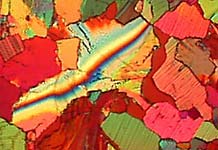Although the SeE program is inherently multidisciplinary, students develop additional depth by focusing on biological, chemical, or earth science aspects of environmental science. Each student takes three Thematic Subjects in his or her focus area of choice.
Earth Science Focus
12.130 Sedimentary Geology (Fall)

Intended for earth scientists and engineers who require a knowledge of the structure and complexity of shallow to deeply-buried sedimentary aquifers. Content focuses on the analysis of depositional systems and facies and architecture; the nature and origin of geometry and scales of vertical and lateral inhomogeneity; reconstruction of sedimentary basins and their interpretation; quantitative methods of spatial and temporal correlation; numerical forward modeling and use of simulation in characterization of aquifer geometry. Two field trips explore unconsolidated as well as lithified sediments.
12.163 Surface Processes and Landscape Evolution (Fall)

Examines the interaction of climate, tectonics, and surface processes in the sculpting of the Earth's surface. Quantitative introduction to mechanics of fluvial, hillslope, and glacial processes. Essentials of weathering, soil formation, runoff, erosion, slope stability, sediment transport, river morphology, glacial erosion, and volcanism. System responses to climatic and tectonic forcings, including: glaciation, sea level change, uplift, subsidence, and post-glacial isostatic rebound. Additional instruction in: computer modeling in the study of surface processes, image analysis, and GIS applications in surface hydrology and slope stability.
12.214 Environmental Geophysics (Spring)
Introduction to basic geophysical methods that can be used for environmental site characterization and shallow geological investigations. Techniques include seismic, electrical, and electromagnetic sounding; ground-penetrating radar, magnetics, gravity, and borehole geophysics. Lectures emphasize basic principles and a physical understanding of the geophysical methods with environmental and engineering applications in mind. Some specific case histories are included. A few weekends of field measurements at representative local sites are included. Lab sessions cover modeling and interpretation of geophysical field data.
Biology Focus
1.018J Fundamentals of Ecology (Fall)
Basic subject in ecology: understanding the flow of energy and materials through ecosystems, and what regulates the distribution and abundance of organisms. Productivity and biogeochemical cycles in ecosystems; trophic dynamics; community structure and stability; competition and predation; evolution and natural selection; population growth; and physiological ecology. Emphasis on aquatic systems.
5.12 Organic Chemistry (Fall, Spring)

Introduction to organic chemistry. Development of basic principles to understand the structure and reactivity of organic molecules. Emphasis on substitution and elimination reactions and chemistry of the carbonyl group. Introduction to the chemistry of aromatic compounds.
7.03 Genetics (Fall)
The principles of genetics with application to the study of biological function
at the level of molecules, cells, and multicellular organisms, including humans.
Structure and function of genes, chromosomes and genomes. Biological variation
resulting from recombination, mutation, and selection. Population genetics. Use
of genetic methods to analyze protein function, gene regulation and inherited
disease.
Chemistry Focus
5.03 Principles of Inorganic Chemistry I (Spring)

Presents principles of chemical bonding and molecular structure, and their application to the chemistry of representative elements of the periodic system.
5.12 Organic Chemistry (Fall, Spring)
Introduction to organic chemistry. Development of basic principles to understand the structure and reactivity of organic molecules. Emphasis on substitution and elimination reactions and chemistry of the carbonyl group. Introduction to the chemistry of aromatic compounds.
5.60 Thermodynamics and Kinetics (Fall, Spring)
Equilibrium properties of macroscopic systems. Basic thermodynamics: state of a system, state variables. Work, heat, first law of thermodynamics, thermochemistry. Second and third law of thermodynamics: entropy. Gibbs function, phase equilibrium properties of solutions. Chemical equilibrium of reactions in gas and solution phase. Rates of chemical reactions.